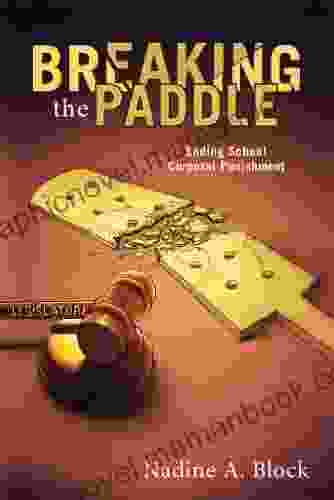Breaking the Paddle: Ending School Corporal Punishment

Corporal punishment in schools has been a controversial issue for decades. While some argue that it is an effective form of discipline, others believe that it is a form of violence against children that has no place in schools.
4.4 out of 5
| Language | : | English |
| File size | : | 4999 KB |
| Text-to-Speech | : | Enabled |
| Screen Reader | : | Supported |
| Enhanced typesetting | : | Enabled |
| Word Wise | : | Enabled |
| Print length | : | 213 pages |
| Item Weight | : | 7.1 ounces |
In this article, we will examine the arguments for and against school corporal punishment, and provide an in-depth look at the movement to end corporal punishment worldwide.
Arguments for School Corporal Punishment
There are a number of arguments that have been made in favor of school corporal punishment. These include:
- It is an effective deterrent to misbehavior.
- It teaches children respect for authority.
- It helps children to learn from their mistakes.
- It is a necessary form of discipline for children who are out of control.
However, there is little evidence to support these claims. In fact, research has shown that corporal punishment is actually ineffective at deterring misbehavior, and can even lead to more aggression and violence.
Arguments Against School Corporal Punishment
There are a number of arguments that have been made against school corporal punishment. These include:
- It is a form of violence against children.
- It is humiliating and degrading.
- It can cause physical and psychological harm.
- It violates children's rights.
Corporal punishment is a form of violence, and it has no place in schools. It is humiliating and degrading, and it can cause physical and psychological harm. It also violates children's rights, including their right to be free from violence and their right to education.
The Movement to End School Corporal Punishment
The movement to end school corporal punishment began in the early 20th century. In 1948, the United Nations Universal Declaration of Human Rights declared that "everyone has the right to be free from ... cruel, inhuman or degrading treatment or punishment." In 1989, the United Nations Convention on the Rights of the Child (CRC) declared that "children have the right to be protected from all forms of physical or mental violence, injury or abuse, neglect or negligent treatment, maltreatment or exploitation, including sexual abuse." The CRC has been ratified by 193 countries, making it one of the most widely ratified human rights treaties in the world.
In recent years, there has been a growing movement to end school corporal punishment worldwide. This movement has been led by a number of organizations, including the Global Initiative to End All Corporal Punishment of Children, the United Nations Children's Fund (UNICEF),and Human Rights Watch.
The movement to end school corporal punishment has made significant progress in recent years. In 2011, the United Nations General Assembly adopted a resolution calling for the abolition of corporal punishment in schools. In 2016, the European Court of Human Rights ruled that corporal punishment in schools is a form of torture and is therefore illegal.
Today, corporal punishment is banned in schools in over 150 countries. However, it is still legal in some countries, including the United States.
Ending School Corporal Punishment in the United States
In the United States, corporal punishment is still legal in schools in 19 states. However, there is a growing movement to end corporal punishment in the United States. In recent years, several states have passed laws to ban corporal punishment in schools, including Texas, California, and New Jersey.
The movement to end school corporal punishment in the United States is gaining momentum. With continued public support and political will, it is possible to end corporal punishment in schools in the United States once and for all.
Corporal punishment is a form of violence against children that has no place in schools. It is ineffective, harmful, and violates children's rights. The movement to end school corporal punishment worldwide has made significant progress in recent years, but there is still much work to be done.
By working together, we can create a world where all children are free from the fear of violence and abuse.
4.4 out of 5
| Language | : | English |
| File size | : | 4999 KB |
| Text-to-Speech | : | Enabled |
| Screen Reader | : | Supported |
| Enhanced typesetting | : | Enabled |
| Word Wise | : | Enabled |
| Print length | : | 213 pages |
| Item Weight | : | 7.1 ounces |
Do you want to contribute by writing guest posts on this blog?
Please contact us and send us a resume of previous articles that you have written.
 Top Book
Top Book Novel
Novel Fiction
Fiction Nonfiction
Nonfiction Literature
Literature Paperback
Paperback Hardcover
Hardcover E-book
E-book Audiobook
Audiobook Bestseller
Bestseller Classic
Classic Mystery
Mystery Thriller
Thriller Romance
Romance Fantasy
Fantasy Science Fiction
Science Fiction Biography
Biography Memoir
Memoir Autobiography
Autobiography Poetry
Poetry Drama
Drama Historical Fiction
Historical Fiction Self-help
Self-help Young Adult
Young Adult Childrens Books
Childrens Books Graphic Novel
Graphic Novel Anthology
Anthology Series
Series Encyclopedia
Encyclopedia Reference
Reference Guidebook
Guidebook Textbook
Textbook Workbook
Workbook Journal
Journal Diary
Diary Manuscript
Manuscript Folio
Folio Pulp Fiction
Pulp Fiction Short Stories
Short Stories Fairy Tales
Fairy Tales Fables
Fables Mythology
Mythology Philosophy
Philosophy Religion
Religion Spirituality
Spirituality Essays
Essays Critique
Critique Commentary
Commentary Glossary
Glossary Bibliography
Bibliography Index
Index Table of Contents
Table of Contents Preface
Preface Introduction
Introduction Foreword
Foreword Afterword
Afterword Appendices
Appendices Annotations
Annotations Footnotes
Footnotes Epilogue
Epilogue Prologue
Prologue Sean O Casey
Sean O Casey Lise Pyles
Lise Pyles Amy Alves
Amy Alves Zeba Ali
Zeba Ali Patrick Fagen
Patrick Fagen Kathleen Davis
Kathleen Davis Elizabeth Hill
Elizabeth Hill T A White
T A White Andrea Girolamo Gallo
Andrea Girolamo Gallo Heather Hamilton Senter
Heather Hamilton Senter Tessa Ward
Tessa Ward Jane Gilgun
Jane Gilgun Sarah Penner
Sarah Penner Robert A Caro
Robert A Caro Pankaj Gupta
Pankaj Gupta Andrew Baltzegar
Andrew Baltzegar John Challis
John Challis Dan Kluger
Dan Kluger Craig Karmin
Craig Karmin Rob Harris
Rob Harris
Light bulbAdvertise smarter! Our strategic ad space ensures maximum exposure. Reserve your spot today!

 Gene SimmonsRurouni Kenshin Vol 13: Beautiful Night - A Masterpiece of Historical Action...
Gene SimmonsRurouni Kenshin Vol 13: Beautiful Night - A Masterpiece of Historical Action...
 Fernando BellDelve into the Enchanting Verses of The Song of Songs New Version: A Poetic...
Fernando BellDelve into the Enchanting Verses of The Song of Songs New Version: A Poetic... Fyodor DostoevskyFollow ·9.2k
Fyodor DostoevskyFollow ·9.2k Rudyard KiplingFollow ·10.5k
Rudyard KiplingFollow ·10.5k Billy FosterFollow ·8.5k
Billy FosterFollow ·8.5k Robert BrowningFollow ·5.2k
Robert BrowningFollow ·5.2k Vernon BlairFollow ·17.9k
Vernon BlairFollow ·17.9k Arthur C. ClarkeFollow ·9.7k
Arthur C. ClarkeFollow ·9.7k Michael CrichtonFollow ·12.4k
Michael CrichtonFollow ·12.4k Ira CoxFollow ·3.7k
Ira CoxFollow ·3.7k

 Rex Hayes
Rex HayesWorld of Dead Volume Issue: An In-Depth Analysis
The World of Dead volume issue...

 Nathan Reed
Nathan ReedHard Lessons Learned from ERP Rollouts: A Hivemind...
Enterprise...

 Fernando Bell
Fernando BellWith the Light, Vol. 1: Illuminating the Extraordinary...
The advent of parenthood is a...

 Wesley Reed
Wesley ReedNo Helping Hand: True Story of Deadly Waves
In December 2004,...

 Ruben Cox
Ruben CoxIntroduction to Electrodynamics by David Griffiths: A...
to Electrodynamics by...
4.4 out of 5
| Language | : | English |
| File size | : | 4999 KB |
| Text-to-Speech | : | Enabled |
| Screen Reader | : | Supported |
| Enhanced typesetting | : | Enabled |
| Word Wise | : | Enabled |
| Print length | : | 213 pages |
| Item Weight | : | 7.1 ounces |










